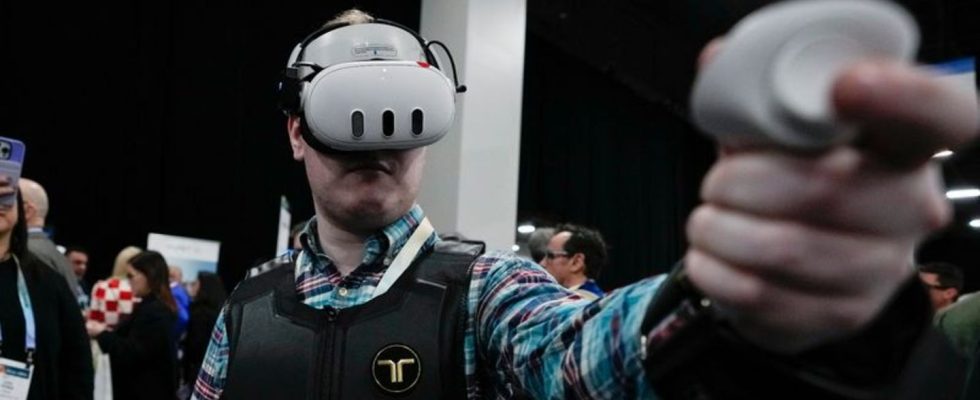Technology fair
CES 2024: Chatbots in cars and stoves – AI needs more data
A visitor tries out bHaptics’ haptic vest during CES. The vest is intended to be used in conjunction with augmented reality systems to provide haptic feedback in video games. photo
© Ryan Sun/AP/dpa
Chatbots like ChatGPT could change how we communicate with the technology around us. The first signs of this can be seen at the CES in Las Vegas.
My car talks to me! And my stove too!
Volkswagen is integrating the popular chatbot ChatGPT into its vehicles. The software, which can form sentences at the linguistic level of a human, will be available in the in-house language assistant IDA, the car manufacturer announced on Monday at CES. The first vehicles with this function can be seen at the technology show.
ChatGPT is expected to come into several series models from the second quarter. The idea is to make communication with the car more natural and to let Volkswagen’s voice assistance software help with more questions beyond the operation of vehicle systems. According to VW, it will be the first volume manufacturer to install ChatGPT in series vehicles. Competitors are also checking this.
The South Korean electronics giant LG announced at CES that home appliances such as stoves could give users notifications in complete sentences instead of as notifications.
Everything in the house collects data for AI
So that the AI software better meets the needs of users, LG wants to use data from hundreds of millions of devices in households on a large scale. While AI programs are often optimized with data from the Internet, LG has the “unique opportunity” to use information from everyday life, said CEO William Cho. He added that this would “of course” only happen with the express consent of the users.
From interactions with various technology in the home, conclusions can be drawn about behavior patterns and people’s moods, for example through tone of voice and facial expressions, Cho said. With such data you have a better understanding of what users need and want. Personal data should be processed on devices directly in households and should be particularly protected. LG also wants to open its smart home platform to other providers.
A few years ago, the chip giant Intel quickly rejected the idea of a television that could use a camera to detect the number and mood of people in the room and adjust the program selection as an invasion of privacy.
Little robots roll through the house
LG and Samsung also came up with the idea of providing people with a small robot in the household – which can also collect context for AI assistants. LG’s “AI Agent” is equipped with cameras and other sensors and can explore the house and communicate with the residents. For example, he can bring necessary medication in the morning, greet residents at the front door when they return home and, if necessary, call emergency services, explained LG. After four years, Samsung showed a new version of its spherical mini robot “Ballie”. Thanks to its cameras, it can help create a 3D plan of the home, which is intended to make it easier to operate a connected home. The device now also has a projector that can display images and information on the wall or ceiling. With overlays on the floor, “Ballie” can also keep pets entertained.
Electric car drives itself to the plug
On a trial basis, Bosch and VW are allowing electric cars to automatically drive to a charging station and refill their batteries. The vehicles then independently look for a free space in the parking garage. Bosch and Volkswagen’s software subsidiary Cariad see the idea as a solution to waiting times in front of the pillars. The system also eliminated blocking fees for drivers who do not drive their cars away quickly enough after charging is complete. Driverless charging is being tested in the Bosch development parking garage in Ludwigsburg. The charging cable is plugged in and pulled out by a robot arm. German companies showed in Las Vegas that they are leaders in future technologies such as autonomous driving, digital and climate-friendly mobility solutions and artificial intelligence, said Federal Digital and Transport Minister Volker Wissing.

